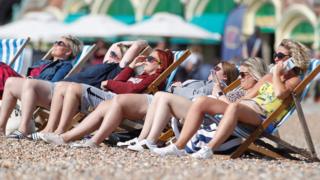Coronavirus: 'Rule of six' comes into effect
 Image copyright
Reuters
Image copyright
Reuters
Restrictions banning social gatherings of more than six people have come into effect, following a rise in coronavirus cases.
The "rule of six" applies in both indoors and outdoors in England and Scotland, and indoors only in Wales.
Restrictions in England affect everyone, but do not include children under 11 in Wales or under 12 in Scotland.
Some Tory MPs have urged No 10 to also exempt young children in England.
The new rules are introduced as the UK's R number escalates to between 1 and 1.2 for the first time since March, indicating infections are increasing.
A further 3,330 positive cases were recorded in the UK on Sunday - the third consecutive day in which cases have been over 3,000 - with five more deaths reported.
According to the UK government's coronavirus dashboard, the total number of reported coronavirus deaths across the UK is 41,628.
Home Secretary Priti Patel urged the public not to break the rules, as police forces vowed to enforce them.
Ms Patel said: "Across the country, we have all made enormous sacrifices in the fight against coronavirus. However, the recent rise in cases makes it clear that more needs to be done to stop the spread of this disease."
Cabinet Office minister Michael Gove defended the new measures in England as "absolutely right", saying some people had "unwittingly" contributed to the spread of the virus because of the way they had interacted.
"Therefore, a clear message - as simple as possible - makes it easier for all of us to do what is helpful to others," Mr Gove said.
At-a-glance: What are the new rules?
Under the new rules, larger gatherings are still allowed at gyms, schools, places of worship, weddings and funerals. Education and work settings are not affected.
The "rule of six" in England replaces the existing ban on gatherings of more than 30 people and the current guidance on allowing two households to meet indoors.
England, Scotland and Wales each have new restrictions.
Groups larger than six can be broken up by police, with members of the group facing fines of £100 for a first offence, doubling on each further offence up to £3,200.
Northern Ireland announced a six person, two household limit on indoor gatherings on 24 August, a reduction on a previous restriction of 10 people from four households.
The devolved nations have powers to set their own coronavirus restrictions, and while the UK nations have broadly moved in the same direction, they have done so at their own pace during the pandemic.
The Metropolitan Police said it will deploy resources across the capital to enforce the tighter restrictions on social gatherings.
But the West Yorkshire Police Federation, which represents rank-and-file officers, warned that staff are already so stretched that relying solely on the police to enforce the new law is unrealistic.
Chair of the National Police Chiefs' Council Martin Hewitt said preventing the spread of coronavirus is "a shared effort".
He said: "The demands on the police service are now at similar levels to before the pandemic, which makes it crucially important that we all take personal responsibility, stick to the limits and prevent the spread of this deadly virus."
The government said that Covid-secure marshals will be introduced in town and city centres to help ensure rules are followed.
But local councils - who would be expected to provide the staff - said they would need to be fully funded.